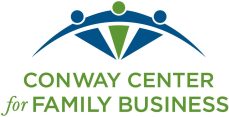Protect Your Cash Cow by Choosing the Right Entity Structure for Your Family Business
by Bea Wolper, Emens & Wolper Law Firm
In a recent session of the Women in Family Business Peer Group at the Conway Center for Family Business, we discussed the importance of choosing the right entity structure to protect your family business. Here are some highlights from that discussion:
Types of entities:
Sole Proprietorship – you own your business and are personally responsible for its debts. It has personal liability issues that often insurance cannot cover!
Limited Liability Company (LLC) –Separate legal entity. If formed correctly, you cannot be personally liable for your company’s debts or liability. It is very easy to set up and adds a level of protection that the sole proprietorship does not offer.
Partnership – you go into business with someone else—even if you do not have an agreement. It can be a separate legal entity. Partnerships can work, but don’t forget the need to have a good buy-sell agreement!
Corporation – Separate legal entity. This type of entity has specific rules, and without a “close corporation agreement” must have a board of directors and officers. Types:
S-Corp = a smaller-type company with the profits and losses flowing through you.
C-Corp = usually a larger company and the profits can stay in the company. However, the company pays taxes and when you take the money out – you pay taxes again. This is known as “ double tax.” The tax rate of a C-Corp may be significantly less so for some companies who are in rapid growth mode, and who want to acquire other companies – it may make financial sense.
By Ohio law, without a close corporation agreement, an Ohio corporation needs to do the following each year:
- hold an annual meeting to share financial information with its shareholders
- compile annual shareholder and director minutes
- elect directors and officers
If you have not done minutes in the past, you can adopt a formal ratification of your minutes to protect yourself from litigation. Then don’t forget to file this document in your minute book and start taking minutes!
Own vs. Lease:
If you are an LLC and own your land and building, that is ok—and you have a lease with the operating company. However, if you are a corporation, ideally (for tax reasons) you want the land and the building owned by an LLC that leases the land and building to the operating company.
By having a lease between the LLC and the operating company, the “retiring” owners can still own the land and receive rental income, while the Next Gen own and grow the business – a win-win! Make sure though that the land owner decision-maker is closely aligned with business owner so that you get fair market value and the rent is not increased arbitrarily .
Advantages of Establishing Multiple LLCs:
The discussion that resonated the most with the women in the room centered around the need to establish separate LLCs. Company-owned (or individual-owned) but separate LLCs can be very useful for tax, liability and planning purposes. You may want to consider separate LLCs for each commercial property, equipment, or division of your company. This keeps the liability contained to that specific entity (LLC), and you can easily sell it off if needed so as not to drag down the thriving divisions or your parent company.
Hopefully this brief overview reminds you that you need to do everything you can to protect your cash cow now! Your planning should focus on how to achieve this goal and how to protect what is most sacred to you, whether it is your personal financial wealth or the division of the company you want to protect. Put these steps into action today and it will be well worth it – for your family business and your peace of mind!
Bea Wolper is President of the law firm of Emens & Wolper Law Firm, Columbus, Ohio, where her practice focuses on succession planning, estate planning, oil and gas law, contracts and the buying and selling of assets and businesses, with an emphasis on family-owned businesses. She is also the co-founder of the Conway Center for Family Business.

